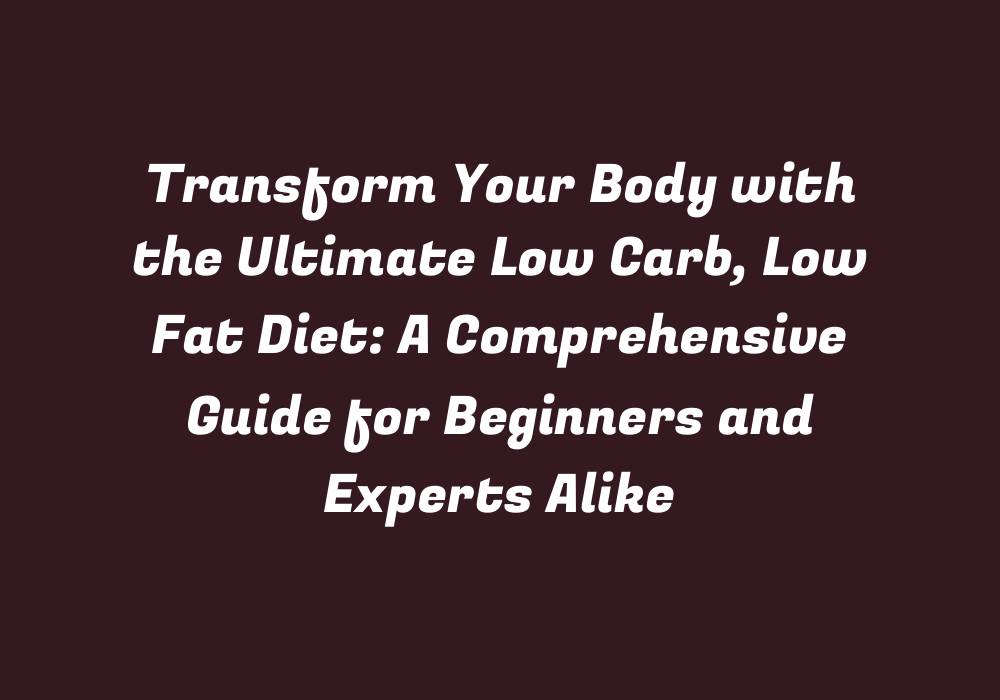Transform Your Body: Embrace the Ultimate Low Carb, Low Fat Diet Guide
Want to achieve a healthier body? Start by adopting a low carb, low fat diet. This eating plan can help you reduce weight, regulate blood sugar levels, and improve your overall well-being. In this comprehensive guide for beginners and experts alike, we will discuss the benefits of following such a diet, essential food choices, and tips to make it a sustainable lifestyle habit.
Why Choose a Low Carb, Low Fat Diet?
A low carb, low fat diet focuses on reducing your intake of both carbohydrates and fats in favor of consuming more protein and essential nutrients. This eating approach has been shown to promote weight loss, improve heart health, regulate blood sugar levels, enhance energy levels, and minimize inflammation. By focusing on whole foods and healthy fats, you can enjoy a variety of nutritious meals that still provide the necessary nourishment for your body.
Food Choices: Making Healthy Eating Decisions
Carbohydrates: When adopting a low carb, low fat diet, choose complex carbs like fruits, vegetables, whole grains, and legumes. Avoid refined and simple sugars that have high glycemic indexes, which can cause spikes in blood sugar levels. Aim for 10-35% of your daily caloric intake to come from carbohydrates.
Fats: Consume healthy fats, such as avocados, olives, nuts, seeds, and wild-caught fatty fish. Limit unhealthy saturated fats found in processed meats and deep-fried foods, as well as trans fats in processed snacks and packaged baked goods. Strive for 20-35% of your daily calories to come from healthy fats.
Proteins: Prioritize lean proteins like poultry, fish, eggs, and plant-based sources such as beans, legumes, and soy products. Limit red meats and processed meat alternatives. Consume the appropriate amount of protein based on your body weight and daily activity level.
Tips for a Successful Low Carb, Low Fat Diet
Plan your meals: Planning ahead will help you avoid unhealthy temptations. Create weekly meal plans based on the nutritional guidelines discussed above. Consider incorporating a variety of ingredients to keep your diet interesting and ensure you get essential vitamins, minerals, and antioxidants.
Monitor portion sizes: Tracking what you eat can help prevent overindulgence in unhealthy snacks or meals. Pay attention to the recommended serving sizes on food labels and adjust your portions accordingly. Use a measuring cup for liquids like oil, milk, and juice.
Focus on whole foods: Opt for fresh, unprocessed ingredients rather than pre-packaged and processed options. Whole foods provide valuable nutrients and fiber that keep you feeling fuller for longer periods of time, which can help curb cravings.
Stay hydrated: Drinking sufficient water throughout the day supports weight loss, aids in digestion, and helps maintain your body temperature. Aim for about half an ounce of water per pound of body weight daily or simply drink until you feel well-hydrated.
Consider supplements: Discuss with your healthcare provider whether adding specific nutritional supplements to your diet would be beneficial. Some individuals may require extra vitamins and minerals for optimal health, especially those following a restricted diet like low carb, low fat.
In Conclusion
Embracing a low carb, low fat diet can significantly improve your overall health by promoting weight loss, regulating blood sugar levels, and increasing energy. By making strategic food choices based on this eating approach and utilizing helpful tips for maintaining it over time, you can enjoy the benefits of a healthier body and mindset.
Start Your Transformation Today
Remember that change is an ongoing process. Be patient, stay motivated, and gradually integrate this diet into your lifestyle for long-lasting results. With dedication and consistency, you can transform your body and achieve a healthier life through the ultimate low carb, low fat diet.
